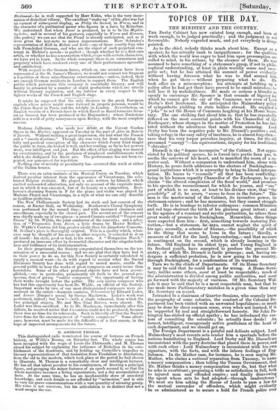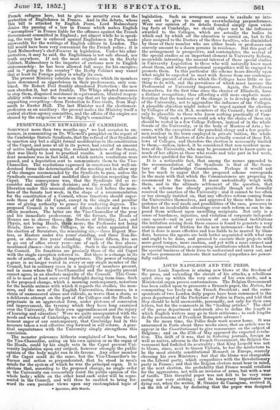TOPICS OF THE DAY.
THE MINISTRY AND THE COUNTRY.
THE Derby Cabinet has now existed long enough, and, been at work enough, to be judged practically ; and the judgment is not favourable. Nobody expected much, and yet everybody is disap. pointed. As to the chief, nobody thinks much about him. Except as a speaker, he has actually sunk to insignificance ; for the qualities with which the world was eager to load him upon presumption are called to mind, in his actions, by the absence of them. He was assumed to have something of a statesman's grasp, if not in philo- sophical understanding, at least in plain worldly sense and ener- getic act; but he has attained the summit of power evidently without having foreseen what he was to find around hiin when he got there — without preparing what to do. Re took office on a misconception; his attempts at botching up a policy after he had got there have proved to be small mistakes; he will lose it by maladroitness. He made so serious a blunder as openly to encourage Mr. Spooner in that crusade of bigotry for which he cannot get the ear of the Commons nor even of Lord Derby's first lieutenant. He anticipated the Commons, policy of sympathetic yielding to state bullies abroad. He supplied a "joke" to set the House of Commons laughing at his Home Secre- tary. The one striking fact about him is, that he has repeatedly differed on the most essential points with his Chancellor of the Exchequer; whose changes in the matter of Protection he has imi- tated without the adroitness that made them amusing. Lora Derby has been the negative pole to Mr. Disraeli's positive ; and, takinr,° refuge in the easy safety of inertness, he is almost forgotten— save that his very torpor provokes inquiry, at times' for the old presumed "energy "—his equivocations, inquiry for his traditional "chivalry."
Disraeli is the "femme incomprise " of the Cabinet. Not appre- ciated by his political spouse, he is forced into poetic faux pas, to soothe the sorrows of his heart, and to manifest the scorn of a su- perior soul. Without a companion to understand him, alone with History, he pours forth addresses to the electors of Buckingham-- grand aspirations which it is unworthy to bring to literal interpre- tation. He burns to " reconcile " all that has been conflicting: being in his human capacity Chancellor of the Exchequer, he Rro- claims "the altered complexion of the fiscal world," and promises to his species the reconcilement for which he yearns, and "one" part of which is so near, at least to his diviner view, that "the possibility" of it, he avers, "seems to loom in the future." This man is the master-mind of the Cabinet, its inventive power, its statesman-science ; and he has measures, but they cannot struggle forth. He is in bondage to inferior colleagues : common Ministers and red tape obstruct the birth of his glorious great intent ; and in the agonies of a constant and mystic parturition, he utters those great words of promise to Buckingham. Meanwhile, three things were expected from him : first, something towards restoring Pro- tection,—but a statesman, he says, cannot neglect the spirit of his age ; secondly, a scheme of finance,—the possibility of which is the thing that seems to loom in the future • thirdly, a measure of relief for the land, long-enduring,—and "that measure is contingent on the second, which is already looming in the future. Old England in its oldest type, and Young England in its freshest youth, have conspired to produce the present Mi- nistry, of which Mr. Disraeli is facile princeps ; and, having un- dergone a sufficient probation, he is now going to the country, through Backingham, for a confirmation of its warrant.
Turn we to the chiefs of Departments. Of its Home Secretary it may be said that he could not go far wrong. A Home Secre- tary, unlike some others, must at least be respectable; much of the administration is divided among public authorities, and must go forward with the majesty i of vastness. Of Mr. Secretary Wal- pole it may be said that he s a most respectable man, but that he has made more Parliamentary mistakes in a given time than any Mr. Secretary on record.
Intrusted to a chairman of Quarter-Sessions, who scarcely knew the geography of some colonies, the conduct of the Colonial De- partment has been visited with an unwonted hopefulness; so much may be done by sheer common sense, even when not learned, if it be supported by zeal and straightforward honesty. Sir John Pa- kington has stirred up official apathy ; he has introduced the cus- tom of consulting the colonists ; he actually does deeds ! An honest, intelligent, courageously active gentleman at the head of each department, and we should get on.
The Foreign Department is a painful and delicate subject. Lord Malmesbury's most recent; acts render him a spectacle before the nations humiliating to England. Lord Derby and Mr. Disraeli are inconsistent with thedoctrine that placed them in power, and with each other : LorpdarYalmesbury is inconsistent with his own signature, with the facts, and with the inborn feelings of Eng- lishmen. In the Mather case, for instance he is seen urging Mr. Mather, who claims a national reparation from Tuscany, to name a money compensation ; then telling the Tuscan Government, that Mr. Mather thinks a money compensation may do, but that what he asks is exorbitant; proposing a trifle as satisfaction in full, both to injured man and offended empire ; and finally disavowing the agent whose acts he had adopted—through inadvertence ! We next see him asking the House of Lords to pass a law for the mutual surrender of offenders, which might evidently be so administered as to secure a hold for French police over French refugees here, but to give no security even for the protect on of Englishmen in France. And in the debate, where this bill is attacked by English Peers, Lord Malmesbury denies the passing of a law in France which makes English "accomplices" in France liable for the offences against the French Government committed in England; yet almost while he is speak- ing, the very law is enforced against Englishmen in Paris, made answerable for the writings of English editors in London. The bill would have been very convenient for the French police ; it is Lord Malmesburfs chef-d'ceuvre in legislation. -Under his admi- nistration, it may be said, the Englishman is not safe abroad, nor truth anywhere. If not the most original man in the Derby Cabinet, Malmesbury is the importer of customs new to English statesmanship : he has been allowed full scope for his energies ; and in "going to the country" the Derby Cabinet may vaunt that at least its Foreign policy is wholly its own.
The present Ministry subsists on the devices which its members have denounced as opprobrious in their predecessors, only com- bined. Sir Robert Peel frankly abandoned Protection : the new men abandon it, but not frankly. The Whigs adopted measures to stop them, disguised resistance in equivocation, blunted respon- sibility with evasion : the new men cap that art by simultaneously supporting everything—from Protection to Free-trade, from May- nooth to Exeter Hall. The last Minister used the electioneer- profession as an auxiliary: the present makes the Ministry itself a central election-agency committee, and the affairs of the empire are steered by the exigencies of "Mr. Rigby's committee."



























 Previous page
Previous page